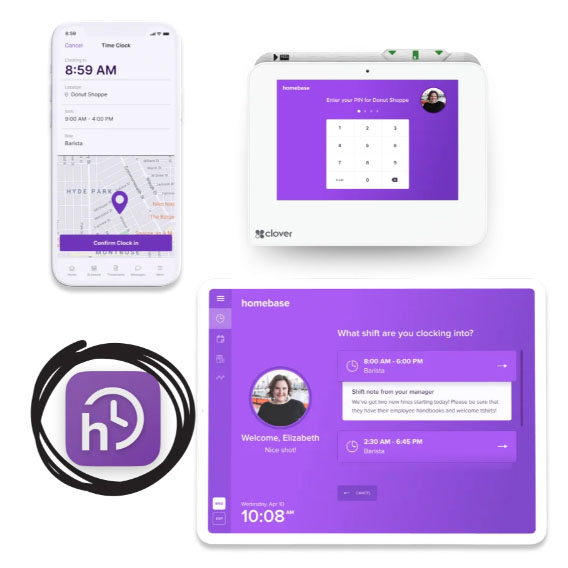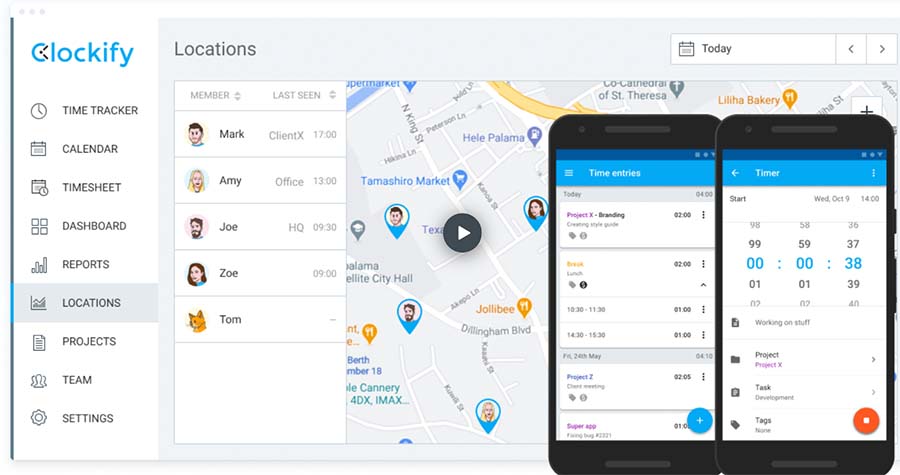Buddy punching is when an employee clocks in or out of an employer’s time-tracking system for a coworker. Essentially, it’s payroll fraud and costs employers millions of dollars each year.
The employees are attempting to game the system by making it seem like one of them is working when they’re not, leading to the employer paying money that isn’t really owed. People usually engage in buddy punching to ensure the absent employee is paid for hours they didn’t actually work or avoids being reprimanded for arriving late, leaving early, or otherwise not adhering to their work schedule.
How Buddy Punching Works
Buddy punching (also known as buddy clocking) can be done the old-fashioned way, such as one employee punching in using another employee’s paper time card. Or an employee could be persuaded by a work friend to log in to their phone, chat, or computer system so it appears they are at work.
It could also happen when an employee leaves early but has a coworker log them out of the time tracking system at the scheduled time.
This time-stealing practice is most common in industries that pay an hourly wage and enforce strict attendance policies. Typical businesses affected by buddy punching include:
- Restaurants
- Manufacturing facilities
- Medical companies
- Retail
- Call centers
In some cases, buddy punching may include falsifying hours worked on a project or as part of an agreement. Let’s say, for example, a team has a contract for 100 hours of work, but the job only requires 90 hours to complete. If the team supervisor manipulates the timesheets to make it appear that 100 hours were worked, they’re buddy punching.
Although buddy punching may not seem like a big deal in some instances, if an employee adds even a few extra minutes to their schedule each week, the cost can add up quickly. For example, if one $10 per hour employee fraudulently adds 15 minutes to their schedule once a week for a year, the cost to the employer is $130, not counting lost production. This also doesn’t take into account the cost associated with firing the employee and hiring and training a new employee.
How to Prevent Buddy Punching
Buddy punching can be prevented by tightening your payroll security procedures. To help, you can enforce preventative policies and utilize modern time-tracking technologies.
Did You Know?
According to widely reported stats, 75% of companies lose money to buddy punching, with 20% of every dollar earned lost to some form of time theft.
Click through the tabs for more on preventing buddy punching.
It is up to the employer to clearly define the consequences of buddy punching. If not, they may have employees punching time for others because they don’t realize it is a big deal. Employers should create attendance policies that help avoid these potentially dangerous or expensive situations.
Make the policy part of the employee handbook, publish the policy electronically, and post it near your time clocks. Buddy clocking should also be discussed during the onboarding process. You should require that employees not only understand the policy but sign a statement to that effect. Keep the original in their employee records.
Before creating an attendance policy that includes buddy punching rules and consequences, you’ll want to first check your local employment laws to avoid legal issues should your company be challenged. If your company is small, you may benefit from hiring an HR consultant to help you lawfully create your employment policies.
If you are still tracking time by paper and have more than 10 employees, it is time to upgrade. Modern time-tracking tools utilize cameras, facial recognition technology, biometrics (such as fingerprints), fobs or ID cards, GPS (so you know where they’re clocking in), and more to deter buddy punching.
Take a look at the time clocks and time tracking software we recommend to find a good fit for your business—some are free.
Security cameras are helpful for a variety of reasons. You can place one above the time clock to see who is clocking in and when. Cameras can also be used to monitor other HR issues such as harassment, theft, safety concerns, and vandalism. This type of monitoring technology helps protect the employee and the company.
Additionally, your time clock may offer a security camera feature that records the individual clocking in and out. You can then review the footage if there is an issue to determine if the correct employee clocking in or out.

uAttend offers a built-in facial recognition security feature for employees clocking in and out.
If you provide your employees with a company laptop from which they will clock in and out, it is recommended that you require a unique password for each employee. This password should be highly secure and contain at least:
- One uppercase letter (A,B,C)
- One lowercase letter (a,b,c)
- One number (1,2,3)
- One special character ($,%,!,@,#)
- Minimum of 8 characters

Requiring a strong password can protect your business from buddy clocking.
In addition, it is recommended that you require the user to change their unique password every 90 days at a minimum. This will keep sanctions in place to prevent unauthorized users from gaining access to an employee’s device.
The reason employees buddy punch isn’t always about earning more money. They often do it because they don’t want to lose their job or be reprimanded for being late or leaving early. Many businesses have strict attendance policies that allow little flexibility to accommodate for employees being late.
You don’t want to create an “us versus them” culture where the boss or company is seen as the enemy. This poor work culture results in employees feeling justified in taking action against the company.
Avoid this by creating an inclusive, supportive work culture. You can do this by establishing an attendance policy that helps promote a good work-life balance and by paying employees a competitive wage so they don’t feel the need to “stick it to the man.” Employee managers should be trained to handle attendance issues fairly and sensitively. You’ll also need to build contingency plans should an employee be late so your company doesn’t suffer from losses in production or customer care.
If you think you have a problem with buddy punching or just want to prevent it before it starts, consider using an online time-tracking app like Homebase. For employers with one physical location, it offers a free plan that allows up to 20 employees to clock in via a mobile app. As each employee clocks in, the software takes a picture to help you verify their identity. You can also add advanced features like GPS tracking for an extra fee.
How to Address Buddy Punching With Your Employees
Since buddy punching is time theft and payroll fraud, it should have serious consequences. Many companies enforce strict policies by communicating that those who commit time-tracking violations will be written up or even fired. Most employers outline the consequences of this action in their employment agreements or workplace policies.
Verbal Warning
If this is a first-time incident you should issue a verbal warning to the parties involved. Remind them that you will not tolerate buddy punching in your company as this is a form of time theft and could be punishable by termination. Be clear in your communication and have the employees reread and re-sign your attendance and buddy punching policies.
Written Warning
Should the incident occur again, or if your policy states so for first-time offenders, issue a written warning to the parties involved. The written warning should spell out the rules of the company and policies around buddy punching. Present the written warning to the parties involved and speak to them about the consequences of violating the policy further. Then have them sign the written warning and place it in their personnel file.
Performance Improvement Plan (PIP)
Once an employee has violated your buddy punching policy, you may wish to create a performance improvement plan (PIP). This plan should outline the steps the employee must take to improve their behavior, such as clocking in and out on a manager’s computer or having a manager witness the employee’s clock-in/out habits.
Termination
If you have already issued one or more warnings to an employee for violating the company’s buddy punching policy and the employee has violated it again, it may be time to terminate. Most states have at-will employment laws that will allow you to dismiss an employee for any reason. However, should the employee take you to court for discrimination, be sure you have detailed records of any disciplinary actions taken against the employee.
Bottom Line
Buddy punching is a serious and expensive HR issue to manage, which can lead to decreased morale and production in the workplace. But, you can make efforts to prevent this time theft problem by clearly communicating attendance policies, creating a good work culture, and employing modern time-tracking technologies.
If your company is large, consult with your HR team on how to best create attendance policies. If you are a startup or a small company, consider hiring a human resource consultant to help you create effective attendance policies that include strict rules about buddy punching. Payroll training can also help you find ways to insert more controls into your process.
New to managing employees? Check out our guide to employee management for practical advice.






